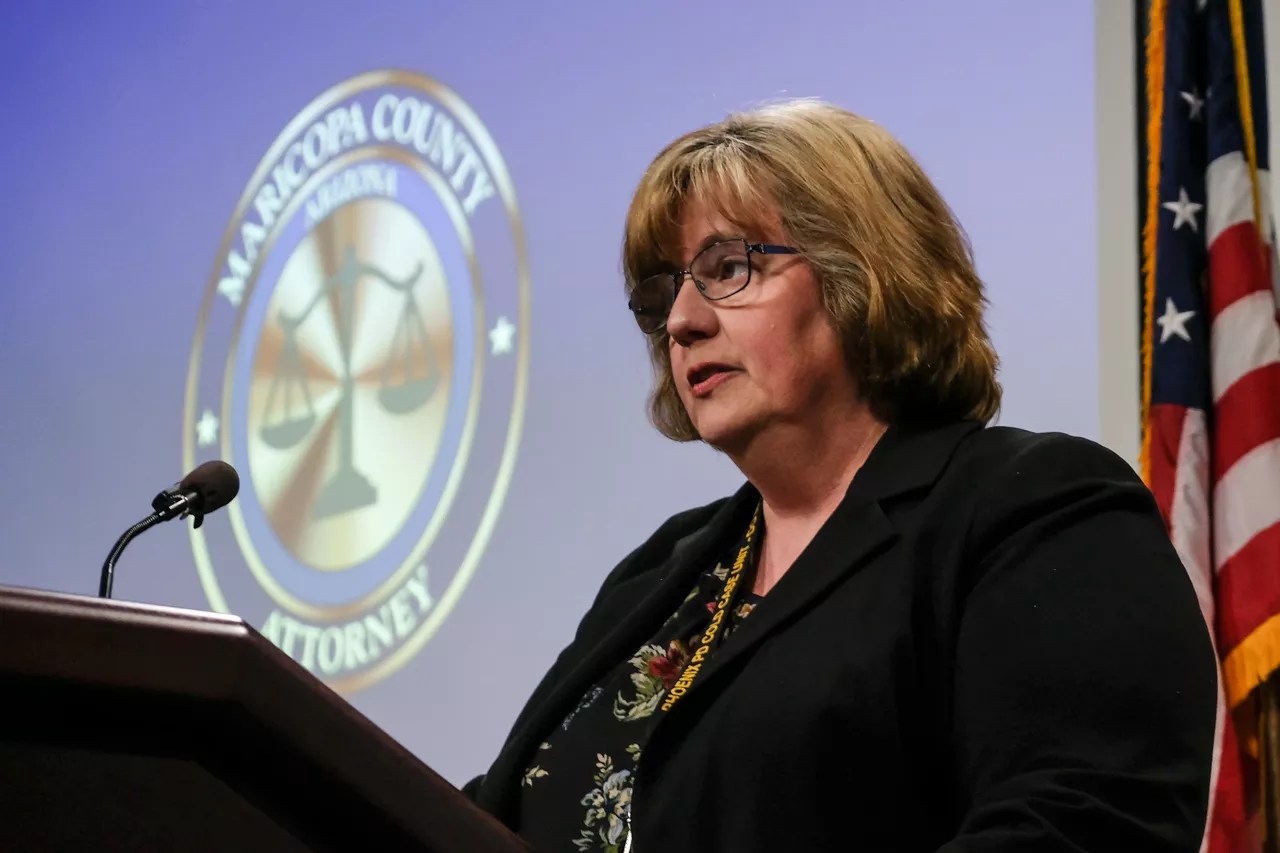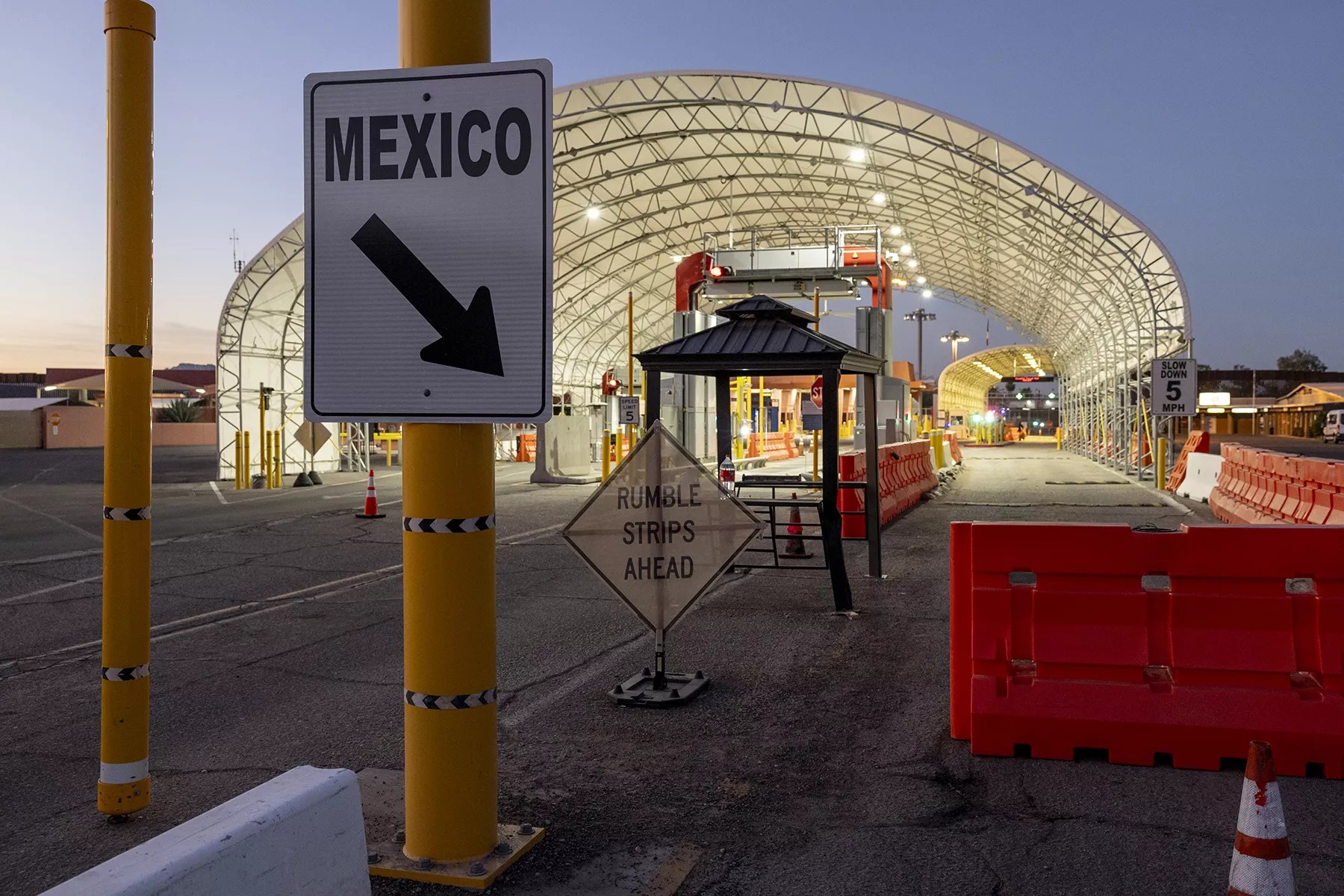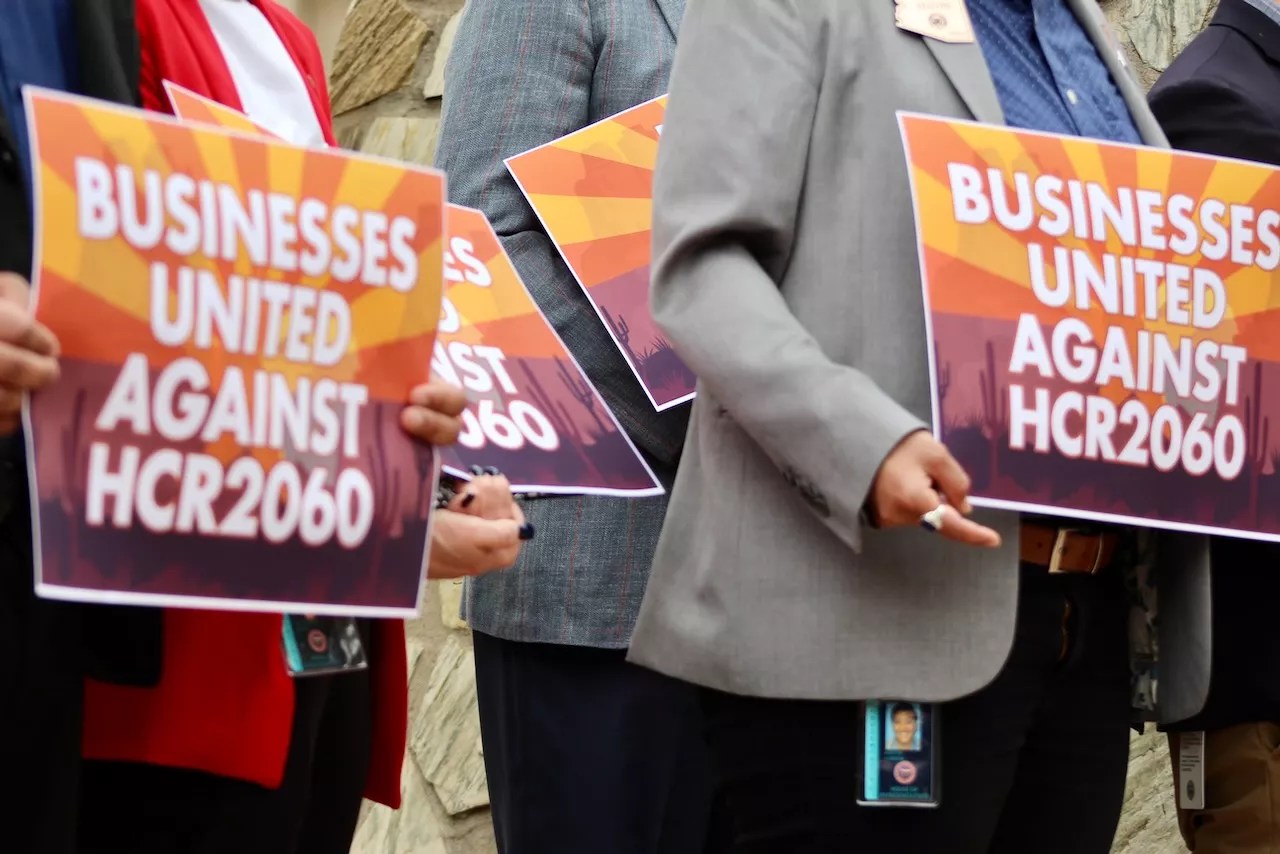
Katya Schwenk

Audio By Carbonatix
It’ll be SB 1070 all over again, and Maricopa County Attorney Rachel Mitchell sounds ready to party like it’s 2010.
This week, Republicans in the Arizona legislature hope to refer to the November ballot an anti-immigrant proposal that would empower local cops to stop and arrest undocumented persons they believe entered Arizona “from a foreign nation at any location other than a lawful point of entry.” Making such a crossing would become a state crime – a misdemeanor on the first offense; a felony on the second.
The bill is House Concurrent Resolution 2060, and critics say it will lead to widespread racial profiling while potentially costing the state hundreds of millions of dollars to implement. It carries strong whiffs of Senate Bill 1070, the anti-immigration law passed in 2010 that was mostly struck down by the U.S. Supreme Court two years later. HCR 2060 is even more directly inspired by a similar Texas law that a federal appeals court has blocked from going into effect while legal challenges play out.
That doesn’t seem to bother Mitchell, whose office would suddenly handle an influx of immigration cases should voters approve the bill this fall. At a press conference on May 16, Mitchell reaffirmed her support for the proposal, which may go to a final vote in the state Senate as early as Wednesday.
“My focus on that is the portion that addresses fentanyl,” Mitchell said when asked by Phoenix New Times about her position. “I think people are not fully aware of just how bad that crisis is.”
HCR 2060 includes a provision to crack down on the smuggling and sale of fentanyl, making it class 2 felony to knowingly sell anything containing fentanyl that causes the death of another person. But fentanyl’s connection to illegal immigration is tenuous at best.
According to a recent U.S. Drug Enforcement Administration fact sheet, more than 90% of fentanyl seizures are made at ports of entry “where cartels attempt to smuggle it primarily in vehicles driven by U.S. citizens.” Undocumented immigrants, it would seem, have little to do with it. There are also already state and federal laws against selling fentanyl, and Gov. Katie Hobbs recently signed a law upping the punishment for dealing it.
So, the fentanyl portion of HCR 2060 may be redundant if not outright ineffective. Meanwhile, its other provisions could bring widespread racial profiling, budget overruns and constitutional challenges in the courts.
That might sound a lot like SB 1070, but Mitchell doesn’t think so.
“I’m not here to say this is a perfect bill, and I am completely intolerant of any discrimination,” she said. “But what I can tell you for sure is that fentanyl does not discriminate. And fentanyl is killing citizens at a rate that is unbelievable.”
Longtime Latino rights activist Sal Reza said the fentanyl clause smacks of a smokescreen. Reza was there for the battles over SB 1070, leading massive demonstrations after it passed. He agreed that fentanyl is absolutely a problem. But he said addressing it through HR 2060 was an effort by Republicans to make voters more comfortable with legalizing racial profiling in November.
“That was a fucking bullshit move,” Reza said. “They put that in there just to have the sympathy of the people who are against fentanyl, against drugs. And that’s fucked up, man.”

Most illicit fentanyl is carried by American citizens through U.S. ports of entry — such as the one in Lukeville, Arizona — and not through other border crossings by undocumented immigrants.
John Moore/Getty Images
‘A racist law’
Whether or not HCR 2060 does much to stem the tide of fentanyl overdoses, its effect on immigration is more clear: It’s likely to make a mess of it, critics said, while exposing brown-skinned Spanish-speaking residents to state-sanctioned discrimination.
“It’s a racist law – 150% racist,” Reza said. “Because it’s specifically targeting us, targeting the 90% of the people who come across the border undocumented. It’s not targeting the Canadians. It’s not targeting the snowbirds who come in from the North.”
Also called the “Secure the Border Act,” the proposed statute allows any court in the state to order someone it deemed to have entered the country illegally to leave. Refusal to comply with the order would be a class 4 felony. It would also be a class 6 felony for someone unlawfully present in the U.S. to use a false document to apply for a public benefit.
That largely parallels Texas’ Senate Bill 4, which was signed into law in 2023. A federal appeals court blocked that law from going into effect pending ongoing legal challenges, and HCR 2060 contains a provision delaying its implementation until the courts allow SB 4 to be enforced. So far, the effects of SB 4 are purely hypothetical. But the effects of SB 1070, Arizona’s last problematic immigration overhaul, are not.
SB 1070 also allowed police officers to inquire into someone’s immigration status, inflaming racial tensions and leading to roiling protests in Phoenix and beyond. Organizations pulled events from the state, a boycott that one study estimated cost Arizona $141 million in conference cancellations. The new statute comes with its own costs – $325 million just to implement, according to the nonpartisan Grand Canyon Institute – and could have just as harmful an effect on the state’s economy.
For instance, the bill does not explain how a local cop would develop reasonable suspicion or probable cause to arrest someone for entering Arizona from another country. If voters approve it, Reza said, it will inevitably lead to an epidemic of racial profiling by police. That didn’t work so well with SB 1070, and Reza finds it ironic that Mitchell would embrace a measure bound to have the same result.
After all, taxpayers are still paying for the immigration sweeps conducted by former Maricopa County Sheriff Joe Arpaio. In 2013, a federal court ruled that Arpaio’s office had racially profiled Latinos, mandating a set of reforms and appointing a monitor to oversee their implementation. The sheriff’s office remains under the judge’s order, and the county’s budget for fiscal year 2024 projects that by June 30, the cost of compliance will top a quarter of a billion dollars.

Arizona Democratic lawmakers hold signs opposing HCR 2060, a bill they say would escalate the GOP’s war on immigrants, during a press conference in February.
TJ L’Heureux
Worse than SB 1070
HCR 2060 is not SB 1070, though. It may be worse.
Thomas Saenz, president and general counsel for the Mexican American Legal Defense and Educational Fund, said that despite what Mitchell and other supporters of HCR 2060 have said, the measure is far broader and vaguer than SB 1070, which actually included language about not using race or ethnicity in the enforcement of the law.
HCR 2060 contains no such language, he said, and is “much more intrusive on the federal exclusive authority over immigration.” Under SB 1070, he said, police officers had to ascertain whether someone was undocumented and whether they were supposed to turn that person over to federal authorities. HCR 2060 bypasses the feds entirely, putting people into the state’s criminal justice system, which would remove them from the country itself.
“We would cease to be one country if every state was allowed to have its own deportation system,” Saenz said.
Saenz said that by clawing federal power for the state, Arizona would open a can of worms. Immigration law is incredibly complex, he noted, and local cops and judges lack the training and authority to determine whether someone is allowed to be in the U.S. “You are likely to see all sorts of racial profiling by cops, all sorts of bad decisions by judges under the law,” Saenz said. It’d also make cops less effective, he added – for fear of deportation, whole communities would cease cooperating with the police.
Saenz is confident that SB 4, and HCR 2060 if it passes, will be overturned by the courts. Along with the U.S. Justice Department, MALDEF is challenging SB 4, arguing that it violates the U.S. Constitution’s supremacy clause – which holds that federal law trumps state law, especially when it comes to immigration – as well as the Fourth, Eighth and 14th Amendments.
MALDEF also claimed the laws would fly in the face of the U.S. Supreme Court’s ruling in Arizona v. U.S., in which the high court overturned most of SB 1070 and effectively limited the enforcement of its so-called “papers please” requirement. In that decision, the court reaffirmed the federal government’s “broad, undoubted power over the subject of immigration and the status of aliens,” rejecting Arizona’s attempt to establish its own immigration scheme.
The court did allow police officers to inquire about immigration status but only during lawful contact and when reasonable suspicion exists that an individual is an undocumented alien.
“If police stop someone based on nothing more than possible removability,” the court added, “the usual predicate for an arrest is absent.”

Tamika Wooten, a Democrat running for Maricopa County Attorney, said she “will not support racial profiling of black and brown drivers, simply on a hunch.”
Courtesy of Tamika Wooten
A political ploy
Reza called HCR 2060 “a political ploy with dangerous consequences.” Republicans want it on the ballot, he said, to rile up their base and help return former President Donald Trump to the White House. Mitchell is also on this year’s ballot, and her stance on HCR 2060 caught flak from rivals on both sides.
Democrat Tamika Wooten, who would face the winner of the Republican primary in the general election, said she opposed HCR 2060 because it is unconstitutional and could lead to discriminatory practices by law enforcement.
“I will not support racial profiling of black and brown drivers, simply on a hunch (or given racially unconstitutional authority under 2060) that they MIGHT encounter someone who has crossed the border illegally,” she wrote to New Times in a text message. “Our law enforcement is already short-staffed.”
From Mitchell’s right flank came an attack from Gina Godbehere, Mitchell’s opponent in the Republican primary in July. Godbehere criticized the county attorney as a Johnny-come-lately who hasn’t embraced the right’s anti-immigrant rhetoric with enough fervor.
“I’ve been talking about the border crisis since I entered this race,” Godbehere said in a statement issued by a spokesperson. “My opponent has been absent from these issues, and Maricopa County deserves a leader that will work in step with legislators to make sure we’re doing all we can to address our border crisis.”
HCR 2060 is bad, and Republican political consultant Tyler Montague thinks Arizonans – and undocumented immigrants – deserve something better. Montague opposed SB 1070 at the time and is against HCR 2060, but he fears it will pass because of frustration over how President Joe Biden has handled the border. The proposed law is “ripe for abuse,” he said, and he’s worried it will demonize immigrants in the state.
Yes, there are “tons of undocumented folks showing up every day” in his community, he said. But that’s not a negative.
“I meet some of the nicest people,” Montague said. “Of course, if you pack up all your crap, sell everything you’ve got and walk hundreds of miles for opportunity, guess what? You’re probably a decent person.”